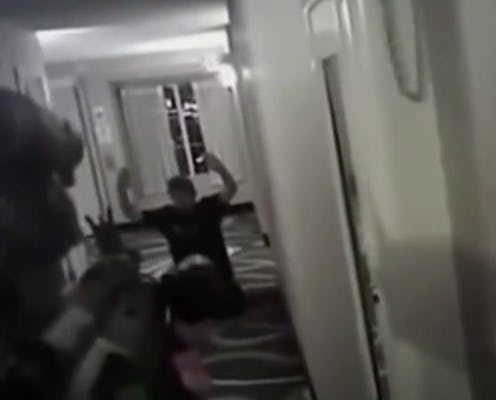News
A Video Of Arizona Police Shooting A Man On His Knees Has Caused National Outrage

On Jan. 18, 2016, Daniel Shaver died at the hands of law enforcement in a Mesa, Arizona, hotel. The officer who shot him, Philip Brailsford, was acquitted Thursday. But a video showing the officer shooting Daniel Shaver has caused outcry among activists who are angry that the officer walked free.
The incident happened when Brailsford responded to reports from guests at a Arizona hotel that someone in a fifth-floor room had been seen with a gun. It was later discovered Shaver was showing off a pellet gun that he uses for his job as a pest control worker to a woman who he had met earlier that day.
In the video, the police officer shouts forcefully at Shaver, who had reportedly been drinking. Shaver obeys Brailsford’s commands and gets on the ground with his hands behind his head, but he has trouble following his orders. Brailsford makes clear that Shaver’s life is in danger from the beginning, saying, “Your hands go back in the small of your back or down, we are going to shoot you, do you understand me?”
Shaver is unarmed and struggles to understand the officer. He begs with him, saying, "Please don't shoot me." When Shaver responds to Brailsford’s order to crawl toward him, his hand moves toward his back for a moment, and the officer shoots him with an AR-15 rifle inscribed with the words "You're f*cked," according to the police report.
Brailsford defended himself in court, saying, "I believed 100 percent that he was reaching for a gun."
Note: The video below contains graphic and violent content.
The jurors on the case were shown the footage, but found Brailsford not guilty of second-degree murder. They deliberated for six hours. After the footage was released to the public on Saturday, there was a public outcry by activists who believe the killing was a gross injustice. Mark Geragos, the lawyer for Shaver’s family (he left behind a wife and two children), chalked the shooting up to an “execution.”
Chicago Tribune Metro editor Mark Jacob called the video “must viewing” for “anyone who believes scrutiny of police conduct is unnecessary,” while Intercept columnist Shaun King stressed that Shaver didn’t do anything to deserve his fate: "Daniel was a regular, everyday dude on a business trip. He was married with two wonderful kids." Stephen Resler, a former Arizona prison guard and policeman, tweeted that the footage "looks like murder" to him, asking, “Whatever happened to minimal force used for compliance?
Police shootings are nothing new in the United States. Thus far in 2017, 917 people have been shot and killed by police. The Black Lives Matter movement started in response to a series of police shootings, largely by white officers toward black men. Just a few of the cases that prompted outcry include the 2014 shootings of Michael Brown in Ferguson, Missouri, and Eric Garner, who died in Staten Island after telling police, “I can’t breathe.” The South Carolina officer who shot an unarmed man named Walter Scott was recently sentenced to 20 years in prison. In most of these cases, though, the officers have either are never indicted or are cleared.
The killing of Shaver differs from these killings in one significant way: race was not likely a factor. Some activists hope that people will recognize that police brutality is a problem in America — anyone can be hurt as a result of the overuse of force.
As The Washington Post’s Wesley Lowery argued, the American criminal justice system as it stands “is not designed to indict or convict on-duty police officers who shoot and kill people — no matter the circumstances of the shooting.” On Twitter, photographer Antoinne Johnson called out “All Lives Matter,” which was formed in opposition to Black Lives Matter, criticizing the group for staying silent on the issue.
Following the outcry after police killings during the Obama administration, the Department of Justice implemented a Collaborative Reform Initiative in the hopes of giving local police departments the tools to change their practices, and avoid these shootings in the future.
In September, however, the Justice Department announced it would scale these efforts back — Attorney General Jeff Sessions prefers a hands-off approach to policing. This means that officers might continue to use forceful tactics in the future, without serious oversight from federal agencies.